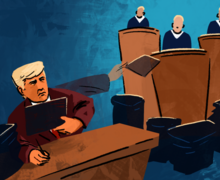Joe Nicoletti touts experience as he looks to become next Syracuse mayor
Courtesy of Joe Nicoletti
Joe Nicoletti said he believes the years he’s spent in government make him the best candidate for the job
Joe Nicoletti remembers sitting in a graduate course in Syracuse University’s Maxwell School in the early 1970s when then-Syracuse Mayor Lee Alexander and Maxwell Dean Alan Campbell called him into the hallway.
Alexander wanted Nicoletti, who had worked on Alexander’s mayoral campaign, to start working part-time in the mayor’s office. Nicoletti accepted the offer and hasn’t looked back since: He’s spent most of the past 40 years working in government. He’s served for different mayors, on the Syracuse Common Council and in the New York State Assembly.
Now, Nicoletti wants to continue his political career as Syracuse’s next mayor. Nicoletti, who has run unsuccessfully for mayor multiple times, announced in February that he was entering the race, which now consists of a seven-person field.
In a recent interview with The Daily Orange, Nicoletti said he believes the years he’s spent in government make him the best candidate for the job. He spent time on the Syracuse Common Council in the 1980s and 1990s and on the state Assembly in the 1990s. He was re-appointed to the Common Council in 2015.
“I think our city is at a very important crossroads,” he said. “It’s going to be difficult. … And I think it requires someone who has deep experience, and someone who is not looking to make this a political stepping stone.”
Here’s how Nicoletti said he plans to tackle several noteworthy issues that the next mayor will face.
Interstate 81
New York state consultants are currently reviewing several options for replacing an elevated portion of Interstate 81 in Syracuse and plan to publish a study on their review later this year.
Nicoletti said he believes the portion of the highway, located near Almond Street, needs to come down.
“I think it would open up an area for research, building, housing, everything in that area that’s needed,” he said.
The “community grid alternative” is the most popular replacement option that would see the highway brought down to street level. Under that option, the existing viaduct would be demolished and traffic would be rerouted around the city on Interstate 481, which would become I-81. Almond Street would become a surface street and amenities would be explored.
But until the consultants’ study comes out, Nicoletti said legislators and the community should “hold their fire” and wait before rushing to any judgments. Other options being considered include the viaduct alternative, which would consist of the highway being widened and heightened, and the tunnel alternative, which would consist of a tunnel being built to carry the highway under the city.
Nicoletti said he hopes legislators can come to a consensus decision around one option once the study comes out.
“My greatest fear is that we won’t be able to and the state will say, ‘Forget it. We’ll throw a coat of paint on it and leave it where it is.’ That would be the worst mistake,” he said.
Merger
In Nicoletti’s eyes, the citizen group Consensus and others are “missing the point” with their calls for a merger between the city of Syracuse and Onondaga County. The proposed merger calls for the consolidation of government between the city and county, as well as the consolidation of a number of offices, such as the Syracuse Police Department and the Onondaga County Sheriff’s Office.
Nicoletti said it isn’t right to enforce a top-down merger and instead proposed that the county and city start by sharing smaller services, such as snowplowing, paving streets and operating parks.
“Mergers that work are ones that come from the bottom up,” he said. “So I would suggest that everyone dry their gunpowder, stop the rhetoric and then we can start talking about sharing services as opposed to mergers. … I don’t think the recommendations of the Consensus report are leading us in the right direction.”
Poverty, crime
Nicoletti described poverty as “worst of all” the issues facing the city. Syracuse is one of the poorest cities in the United States, as 31 percent of its population lived below the poverty line in 2015, according to U.S. Census Bureau data. That ranked Syracuse as the 29th poorest city in the country.
Syracuse has also experienced increasing crime: There were 31 homicides in the city last year, making 2016 the deadliest year in the Syracuse’s history.
Nicoletti said the city’s poverty contributes to its crime, and vice-versa. To solve it, he said he’d work to improve education, create jobs, improve housing and fill vacancies in the Syracuse Police Department.
The police officers filling those vacancies, Nicoletti said, need to reflect the constituents that they serve.
“Our community is incredibly diverse,” he said. “… We need a police department that relates to the various neighborhoods.”
Relationship between city, Syracuse University
Interactions between SU and the city haven’t been as frequent under current SU Chancellor Kent Syverud as they were under his predecessor, Nancy Cantor.
Nicoletti, though, said he would “of course” work closely with the university if he were to be elected mayor. He added that the city provides the university with services and attractions, while the university provides an economic engine for the city.
“I believe a strong partnership with the university and the city benefits all of us,” he said.
Published on March 21, 2017 at 11:02 pm
Contact Michael: mdburk01@syr.edu





